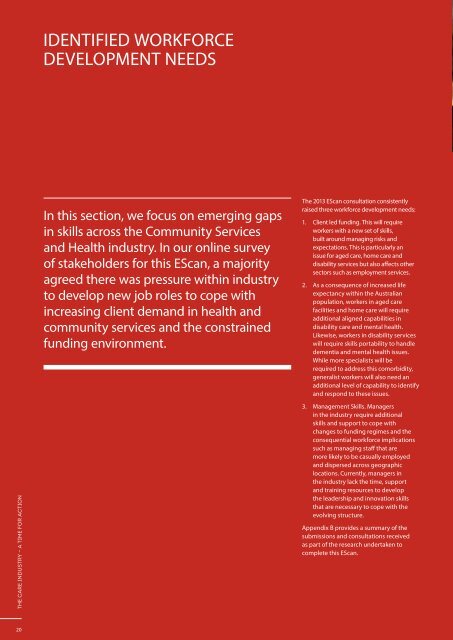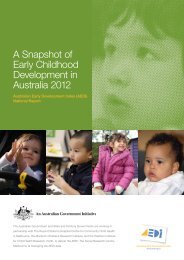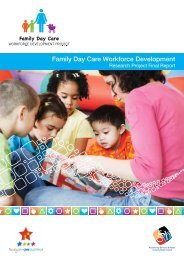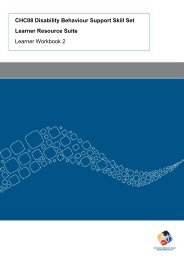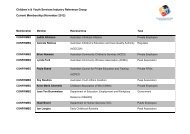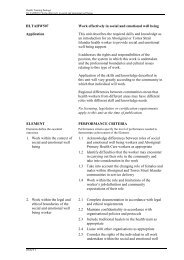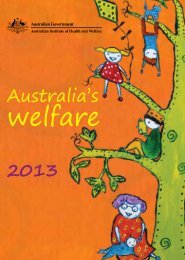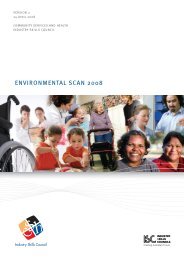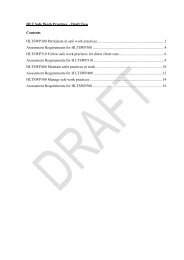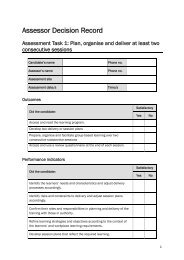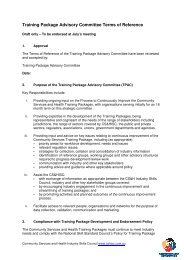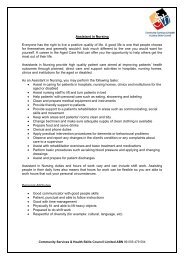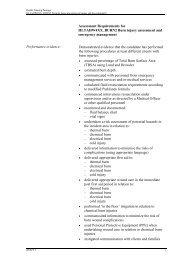2013 Environmental Scan - Community Services & Health Industry ...
2013 Environmental Scan - Community Services & Health Industry ...
2013 Environmental Scan - Community Services & Health Industry ...
Create successful ePaper yourself
Turn your PDF publications into a flip-book with our unique Google optimized e-Paper software.
IDENTIFIED WORKFORCE<br />
DEVELOPMENT NEEDS<br />
THE CARE INDUSTRY – A TIME FOR ACTION<br />
In this section, we focus on emerging gaps<br />
in skills across the <strong>Community</strong> <strong>Services</strong><br />
and <strong>Health</strong> industry. In our online survey<br />
of stakeholders for this E<strong>Scan</strong>, a majority<br />
agreed there was pressure within industry<br />
to develop new job roles to cope with<br />
increasing client demand in health and<br />
community services and the constrained<br />
funding environment.<br />
The <strong>2013</strong> E<strong>Scan</strong> consultation consistently<br />
raised three workforce development needs:<br />
1. Client led funding. This will require<br />
workers with a new set of skills,<br />
built around managing risks and<br />
expectations. This is particularly an<br />
issue for aged care, home care and<br />
disability services but also affects other<br />
sectors such as employment services.<br />
2. As a consequence of increased life<br />
expectancy within the Australian<br />
population, workers in aged care<br />
facilities and home care will require<br />
additional aligned capabilities in<br />
disability care and mental health.<br />
Likewise, workers in disability services<br />
will require skills portability to handle<br />
dementia and mental health issues.<br />
While more specialists will be<br />
required to address this comorbidity,<br />
generalist workers will also need an<br />
additional level of capability to identify<br />
and respond to these issues.<br />
3. Management Skills. Managers<br />
in the industry require additional<br />
skills and support to cope with<br />
changes to funding regimes and the<br />
consequential workforce implications<br />
such as managing staff that are<br />
more likely to be casually employed<br />
and dispersed across geographic<br />
locations. Currently, managers in<br />
the industry lack the time, support<br />
and training resources to develop<br />
the leadership and innovation skills<br />
that are necessary to cope with the<br />
evolving structure.<br />
Appendix B provides a summary of the<br />
submissions and consultations received<br />
as part of the research undertaken to<br />
complete this E<strong>Scan</strong>.<br />
SKILLS FOR CLIENT LED<br />
CARE ENVIRONMENTS<br />
In both aged care and disability services,<br />
the move to a client led policy approach<br />
will increase the number of workers who<br />
physically work outside of centralised<br />
services and who are instead based within<br />
the community. This reduces their close<br />
access to supervisory support, specialist<br />
assistance and also potential learning<br />
opportunities. The positive shift in power<br />
to the client inherent in this approach,<br />
also demands that frontline workers be<br />
equipped with skills to understand the<br />
service delivery framework and negotiate<br />
with and on behalf of clients if the need<br />
arises (Chenoweth and Clements, 2009;<br />
Workplace Research Centre, 2008).<br />
Where client led approaches to care<br />
have been implemented overseas, the<br />
following issues for workers have arisen:<br />
ww<br />
Fewer protections than in institutional<br />
settings for workers in relation to<br />
rostering, scheduling and management<br />
of work tasks, and advanced<br />
occupational health and safety<br />
protocols (Stacey 2005)<br />
ww<br />
Difficulty regulating quality of care in<br />
individualised settings, such as home<br />
care (Bradley et al 2001)<br />
ww<br />
Some resistance among client<br />
advocates in the United States to<br />
the establishment of formal training<br />
requirements (Simon-Rusinowitz et<br />
al, 2010; Doty et al, 2010) although<br />
training funding and standards were<br />
preserved in the English Model<br />
(Carr and Robbins, 2009).<br />
Australia can learn from experiences<br />
overseas. An evaluation of the consumer<br />
directed care initiative (KPMG, 2012)<br />
identified the following skills required<br />
by workers in a client directed model<br />
of aged care:<br />
ww<br />
Experience in individualised<br />
and goal based planning<br />
ww<br />
Building client capacity and<br />
case management<br />
ww<br />
Knowledge of aged care or respite,<br />
but no preconceived ideas about what<br />
community aged care or respite ‘is’<br />
or ‘looks like’ – an ability to ‘think<br />
outside the box’<br />
ww<br />
Financial skills, both in terms of<br />
managing individual budgets and<br />
helping clients to understand their<br />
budget statements (this is quite<br />
different to the standard packaged<br />
care approach)<br />
ww<br />
Commitment to client empowerment<br />
and self-determination.<br />
In a home based setting, individual workers<br />
need to have some understanding of<br />
these skills and what they are responsible<br />
for and those skills that rest with their<br />
supervisors, coordinators or other<br />
specialists. In Australia these are the skills<br />
that will be required by workers assisting<br />
clients during the implementation of the<br />
National Disability Insurance Scheme<br />
(NDIS). Providing frontline workers with<br />
the necessary support via changes to<br />
training packages as well as organisational<br />
practices around risk management,<br />
reporting, and mentoring and supervision,<br />
will be critical to the success of the NDIS.<br />
A priority for CS&HISC in <strong>2013</strong> will be<br />
to assess both the CHC and HLT<br />
training packages against these<br />
new skill requirements.<br />
Further, converting the skills around<br />
planning, case management, financial<br />
skills and values to competencies that<br />
can be included in training packages will<br />
be challenging. The industry is already<br />
examining these competencies within the<br />
new care environment. One Registered<br />
Training Organisation (RTO) expressed<br />
it this way:<br />
“More work is required on the complex<br />
health needs of frail and older individuals.<br />
Job roles in the sector require staff to<br />
have high levels of resilience and the<br />
training packages incorporate standard<br />
employability skills but more direct<br />
attention on this is needed.”<br />
In summary, while the industry is moving to<br />
a model of client led care and associated<br />
autonomous workers, changes to training<br />
packages will be required to reflect<br />
these changes which will need to take<br />
place within a broader framework that<br />
includes supervisory arrangements for<br />
home based care, and clarity on funding<br />
levels to support and remunerate roles<br />
appropriately. We expect our industry<br />
experts to request these changes to<br />
training packages as the trend towards<br />
client led care gathers pace.<br />
ENVIRONMENTAL SCAN <strong>2013</strong> : SECTION TWO IDENTIFIED WORKFORCE DEVELOPMENT NEEDS<br />
20<br />
21


